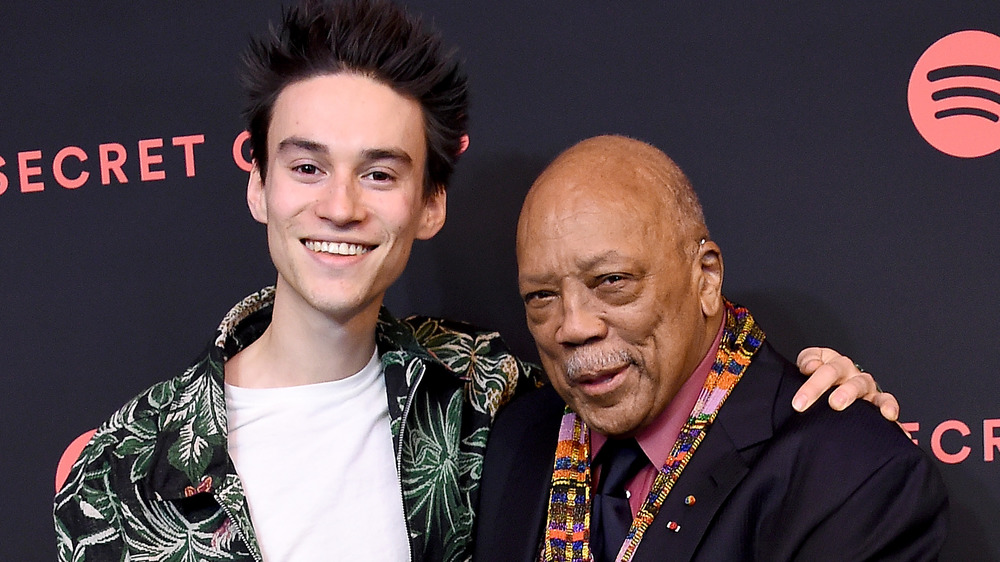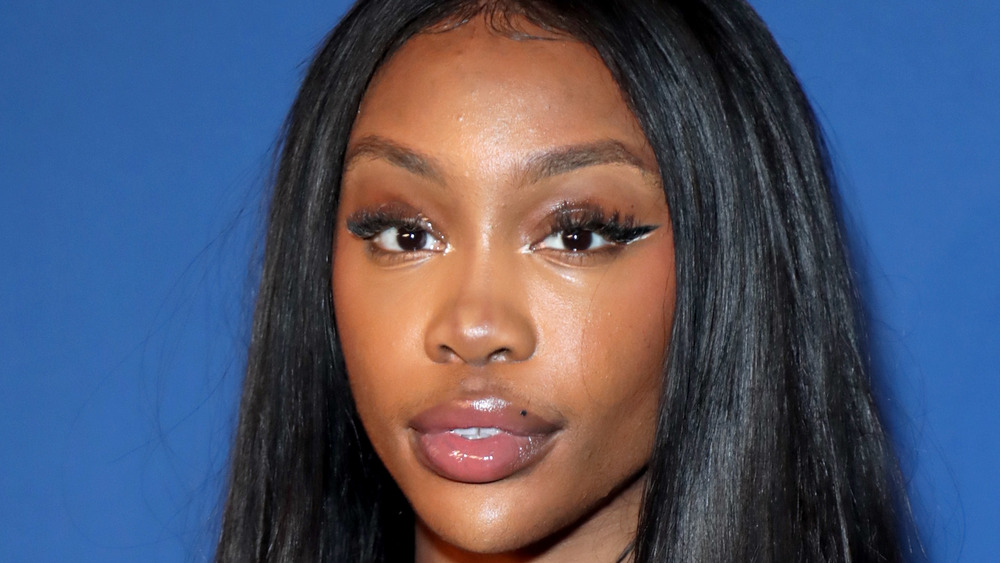The Untold Truth Of Jacob Collier
From a split-cover prodigy on YouTube to a Grammy-winning artist with sleeper hits, Jacob Collier is gradually taking the music world by storm. The 26-year-old North London native is a musical polymath whose talent has gotten him noticed by some of the biggest names in the music industry including Quincy Jones, Chris Martin, SZA, and many more.
With a penchant for playing with sounds that traverse genres, such as jazz, folk, and R&B, Collier is one of the most unique new players in music. Known for refreshing takes on classic records, his hit covers of Lionel Richie's "All Night Long," Michael Jackson's "P.Y.T. (Pretty Young Thing)," and The Beach Boys' "In My Room" relay nostalgia to so many fans. It was his 2013 version of "Don't You Worry 'Bout A Thing" by Stevie Wonder, however, that placed Collier on the map as someone to watch and has been lauded as a true virtuoso. "Jacob is the real GOAT," Ty Dolla $ign told Billboard. "He plays everything, sings his ass off and writes incredible songs."
Despite his hit original songs "All I Need" and "Sleeping On My Dreams," Collier isn't exactly a household name with much mainstream media coverage. Let's take a look at aspects of the bedroom producer's life that have led him to his unsuspecting Grammy nod for Album of the Year.
Music runs in Jacob Collier's family
Jacob Collier actually belongs to quite a musical family. Collier's maternal grandparents, Derek Collier and Leila Wong, were professional violinists — his grandfather was even the concertmaster of the Bournemouth Symphony Orchestra, per NPR. Collier's mother, who raised him and his two younger sisters as a single parent, followed in her parents' footsteps and became an accomplished violinist herself as well as an instructor at the Royal Academy of Music.
Collier's mother even tried to use the family home's backroom as a space to teach lessons, but those intentions fell away once she got wind of how dedicated her son was to music and learning how to play different instruments himself. Besides being a conservatory-trained jazz pianist, Collier also plays a slew of other instruments, most of which his mastery is self-taught. Collier's musical instrument repertoire includes electric bass, double bass, drums and percussion, melodica, guitar, ukulele, accordion, mandolin, bouzouki, dulcimer, tabla, autoharp, and banjo as well as his tenor voice, of course. While growing up, "I was very much encouraged to play, far more than I was encouraged to practice," Collier told The New Yorker. For him, music at home was "pretty much a second language."
Quincy Jones is Jacob Collier's mentor
One of the people most responsible for Jacob Collier's career, besides the prodigy's own musically-inclined family, is none other than groundbreaking record producer Quincy Jones. From Frank Sinatra and Lesley Gore to Aretha Franklin and Michael Jackson, Quincy Jones is no stranger to working with musical greats. The Grammy Lifetime Achievement Award winner saw Collier's Stevie Wonder cover from YouTube, from a friend's email recommendation, and the legend knew that he had struck music gold. "It was apparent that this kid's understanding of music theory, melody, harmony and improvisation was exactly where it needed to be," Jones told Billboard.
Soon after, Collier signed to Quincy Jones Productions and was taking meetings and joining jam sessions with anyone and everyone from Pharrell Williams to Herbie Hancock. On Jones' mentorship, Collier told The New Yorker that the producer had been "almost like a godfather figure in terms of musicality."
After signing Collier, Jones would supposedly enter rooms to show off Collier's talent. "There was a period of time in Quincy's life where he walked into every single meeting ... and the first thing he would do is pull out his laptop and a Bluetooth speaker, and play Jacob's video of 'Don't You Worry 'Bout a Thing,'" Adam Fell, president of Jones' company, told Billboard. "And he would say, 'Have you ever seen anything like this in your life? Because I haven't.' "
What was Jacob Collier's inspiration for Djesse?
Jacob Collier's idea for Djesse spawned from his aim to interact with music and those around him. "I wanted to begin a dialogue with the music world at large," Collier told NPR. "I wanted to be in the center of this journey — essentially, a selfish journey just to learn as much as I could from all of my heroes." A four-volume album, Djesse explores three different areas of musicality.
"There was the orchestral, huge acoustic space with choirs and the orchestral sound and the Big Band sound and all of that — the epic ballads, the great big stretching, yearning chords that come with an orchestra," Collier explains. "Then there was the much smaller space, which was, I guess, based more in world music, jazz music, folk music, songwriting, that smaller acoustic sound."
"And then there was the absence of space altogether," Collier continues. "There's the negative space, the electronic inner wonderland that we all operate within many times a day, which is what goes on inside our heads, what goes on in the darkness, what goes on within the electricity and within the bizarre." Then, he combined all these different elements. "I had to somehow combine all these different sounds and celebrate them at the end altogether, and thus the four volumes of Djesse emerged."
The first three volumes of Djesse, debuted in 2018, 2019, and 2020, respectively. Djesse Volume 4 is expected to be released either at the end of 2021 or in early 2022, according to The Financial Times.
Djesse Volume 3 made Grammy Awards history
When Djesse Volume 3 was released in August 2020, Jacob Collier was not expecting it to be nominated for a Grammy Award. "Djesse Volume 3," the penultimate volume in Collier's grand musical adventure, is "really a quarantine album," Collier relayed to The New Yorker. One of the songs from the volume, "He Won't Hold You," "is about coming to peace with being alone," Collier explained. "So much of my process is a solitary one. I wanted to craft a journey that described that — a mixture between very chaotic sounds that wrapped themselves around you and a simple melody that can rock you to sleep."
Collier was surprised that the album was even nominated, let alone making history. "I was completely flabbergasted," the singer-composer-producer told The Wall Street Journal. "I would never in a million years have predicted that I would get anything like this nomination."
The darkhorse-candidate is the first artist since 1963 to get an album of the year nomination without being on Billboard's album chart, according to Billboard. Most album-of-the-year nominees make the chart's top ten, but Collier's Djesse Volume 3 has had little sales — 22,000 units, including just 3,000 copies as a full album — compared to the average 1.27 million of this year's nominees, per MRC Data (via Billboard).
Jacob Collier collaborated on one of the biggest songs of the year
It turns out that when Jacob Collier's not working on his own music, he is helping other artists with theirs — and, needless to say, he is quite brilliant at that, too. Collier actually worked on one of the most popular songs of the year, SZA's "Good Days." Released on Christmas Day 2020, "Good Days" has become the solo biggest hit of the singer-songwriter's career, according to Rolling Stone. But the hit single that's still topping the charts would not have been possible without Collier.
Producer Loshendrix told Genius that the process leading up to the finished "Good Days" track took two years. It was not until the first half of 2020, when SZA sent the uncompleted song to Collier because of some trouble with the harmonies, that Ctrl artist felt that the single was finally finished. When listening closely to the Billboard chart hit, that is actually Collier's voice that is heard along with SZA's sultry notes, adding depth and dimension to the song.






